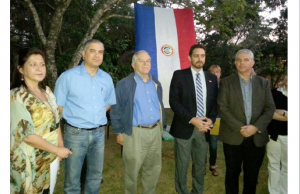Israel’s Minister of Agriculture Yair Shamir headed a large delegation to Paraguay to assess possible areas of development cooperation between the two countries. The Israeli Minister was accompanied by the Ministry of Foreign Affairs’ Head of the Division for Central and South America and the Caribbean, Ambassador Modi Ephraim, and by the Director of MASHAV’s Training Division, Ambassador Mattanya Cohen.
This is the first visit of an Israeli minister in Paraguay in many years, and symbolizes the warming bilateral ties between the two countries, the height of which will be the reopening of the Israeli Embassy in Paraguay in July 2015.
Following a bilateral dialogue, the two countries discussed possible areas of cooperation which covered, among others, modern irrigation methods, administration of water resources, and early childhood education. During the official visit, Minister Shamir and the Israeli delegation met the Shalom Club Paraguay members comprised of MASHAV’s professional training courses graduates, who organized a moving tree planting ceremony held at the local “Israel Forest” in the outskirts of Asuncion.
———–
Israel-Panama free trade negotiations started
Subjects under discussion include access to markets, customs, services and investments, intellectual property, trade obstacles, institutional issues and conflict resolution. Two more rounds of talks are expected before the negotiations are completed.
A 12-strong Israeli delegation headed by Ministry of Economy officials and comprised of professional staff from relevant government ministries are in Panama City to participate in a second round of negotiations for a free trade agreement between Israel and the Republic of Panama. The negotiations are part of the Foreign Trade Administration at the Ministry of Economy’s policy of expanding Israeli exports to new markets, and the Israeli government’s policy of strengthening relations with Latin American countries.
The agreement is expected to serve as another springboard for Israeli service providers – especially in software, communication, information security, engineering and R&D – thus expanding the potential of this and related markets.
The second round of talks began Monday in Panama City and will last four days. Twelve working groups are expected to discuss the following subjects: access to markets, customs, services and investments, intellectual property, protection of flora and fauna and veterinary aspects, trade obstacles, institutional issues and conflict resolution. Two more rounds of talks are expected before the negotiations are completed.
According to the Foreign Trade Administration at the Israeli Ministry of Economy, the economy of Panama is based primarily on a developed service sector which constitutes more than three quarters of its GDP and includes the operation of the Panama Canal, logistics, banking, the free trade zone in Colón, insurance, ports, shipping registration and tourism. Economic growth in Panama in 2013 exceeded 8% and is attributed – among other factors – to the widening of the Panama Canal which began in 2007 at a cost of $5.3 billion. Additional infrastructure development projects expected to take place in the country may very well draw Israeli firms with relevant expertise.
Panama is a candidate to join the Pacific Alliance, a bloc of Latin American nations including Mexico, Colombia (both of which enjoy free trade agreements with Israel), Chile and Peru. The bloc includes 200 million consumers and a joint GDP of over $3 trillion. This constitutes 35% of the total GDP of Latin American countries and over 50% of Latin American trade. Israeli exports to Panama in 2014 stood at $25 million and imports from Panama at $3 million.



















